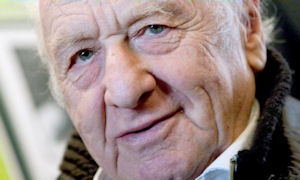Czech Jewish writer Arnost Lustig, 84, dies
01 Mar 2011 The famous Jewish-Czech writer and Holocaust survivor Arnost Lustig has died aged 84. He leaves behind a legacy of many important novels, including ‘ Dita Sax’, ‘ A Prayer for Katerina Horovitzova’ and ‘Darkness Casts No Shadow’. Born to a Jewish family in 1926, Lustig was imprisoned during World War II at Theresienstadt, Auschwitz and Buchenwald, but managed to escape from a transport to the Dachau concentration camp after the train's engine was hit by an American bomber.
The famous Jewish-Czech writer and Holocaust survivor Arnost Lustig has died aged 84. He leaves behind a legacy of many important novels, including ‘ Dita Sax’, ‘ A Prayer for Katerina Horovitzova’ and ‘Darkness Casts No Shadow’. Born to a Jewish family in 1926, Lustig was imprisoned during World War II at Theresienstadt, Auschwitz and Buchenwald, but managed to escape from a transport to the Dachau concentration camp after the train's engine was hit by an American bomber.
Much of his literary work was influenced by his experiences during the war, employing rich, laconic and wry tales of survival and guilt. After participating in the Prague uprising against the Nazis in May 1945, Lustig went into journalism and later covered the 1948 Arab-Israeli war among other things. Later, he became a reporter and director of Czechoslovak Radio, an editor of the youth magazine ‘Mlady Svet’ and a screenwriter for Barrandov studios.
After the Soviet-led crackdown the Prague Spring in 1968, he emigrated to Israel and later America and became a lecturer at Washington, DC. Following the end of communism in Czechoslovakia, he returned to his home country to become editor of the Czech edition of ‘Playboy’. Arnost Lustig won the Franz Kafka Prize in 2008, and his 2000 novel ‘Lovely Green Eyes’ was nominated for a Pulitzer Prize in 2003.
Family members and close friends paid their last respects to him at a ceremony conducted by Chief Rabbi Karol Sidon at the New Jewish Cemetery in Prague. Among them was the head of the Czech Jewish community and vice-president of the World Jewish Congress, Tomas Kraus.
Czech President Vaclav Klaus sent a letter of condolences to Lustig's family. "In your father I have seen a man who was honestly trying for his entire life to find his place in the turbulent world of the latter half od the 20th century, a place on the side of justice, freedom and fundamental human values. We all will miss the personality of his talent and his personal and artistic qualities,” Klaus wrote.